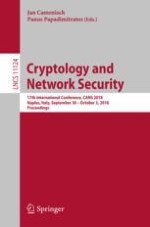2018 | OriginalPaper | Buchkapitel
Breaking the Hardness Assumption and IND-CPA Security of HQC Submitted to NIST PQC Project
verfasst von : Zhen Liu, Yanbin Pan, Tianyuan Xie
Erschienen in: Cryptology and Network Security
Aktivieren Sie unsere intelligente Suche, um passende Fachinhalte oder Patente zu finden.
Wählen Sie Textabschnitte aus um mit Künstlicher Intelligenz passenden Patente zu finden. powered by
Markieren Sie Textabschnitte, um KI-gestützt weitere passende Inhalte zu finden. powered by
